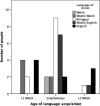The auditory-verbal hallucinations of Welsh-English bilingual people
- PMID: 31187575
- PMCID: PMC7027756
- DOI: 10.1111/papt.12234
The auditory-verbal hallucinations of Welsh-English bilingual people
Abstract
Objectives: Psychological models of voice-hearing propose that auditory-verbal hallucinations occur when inner speech is attributed to a source external to the self. Approximately half of the world's population is multilingual, and the extent to which they use a second language for inner speech depends on their experience and competency in it. Bilingualism therefore provides a natural window into the processes operating in auditory-verbal hallucinations, but no systematic study of voice-hearing in bilinguals has hitherto been conducted.
Design: A mixed-methods observational study of psychiatric service users who hear voices and who are Welsh-English bilingual.
Methods: Thirty-seven participants were interviewed about their history and use of Welsh and English and divided into three groups: those who learnt Welsh first (L1 Welsh), those who learnt English first (L1 English), and those who learnt the two languages simultaneously. Detailed phenomenological data were collected using The Mental Health Research Institute Unusual Perceptions Schedule.
Results: Both qualitative and quantitative data indicated very considerable variation in the extent to which voices were in Welsh, English, or both, with some voice-hearers reporting that the predominant language of their voices had changed with time. There were modest but statistically significant associations between the predominant language of voices and age of language acquisition (late Welsh learners did not hear voices in Welsh), frequency of language use (more frequent use of Welsh was associated with more Welsh voices), and subjective language proficiency (proficiency in English was associated with a tendency to hear English voices).
Conclusions: Although this was a small study, it was the first of its kind. There is a need for more research on the implications of bilingualism for psychosis in particular and mental illness more generally. The results are broadly consistent with the hypothesis that hallucinated voices are misattributed inner speech.
Practitioner points: Assessments of people with mental health difficulties should routinely inquire whether they are multilingual and, if so, which language they prefer to use. People with mental health difficulties may have difficulty expressing complex issues and emotions in a second language, despite apparent fluency. When working with bilingual people who hear voices, mental health professionals should consider the language used by the voices when conducting assessments and proposing formulations.
Keywords: auditory hallucinations; bilingualism; hearing voices; psychosis.
©2019 The Authors. Psychology and Psychotherapy: Theory, Research and Practice published by John Wiley & Sons Ltd on behalf of British Psychological Society.
Figures
Similar articles
-
What is distressing about auditory verbal hallucinations? The contribution of goal interference and goal facilitation.Psychol Psychother. 2017 Dec;90(4):720-734. doi: 10.1111/papt.12135. Epub 2017 Jul 20. Psychol Psychother. 2017. PMID: 28726350
-
Experiences of hearing voices: analysis of a novel phenomenological survey.Lancet Psychiatry. 2015 Apr;2(4):323-31. doi: 10.1016/S2215-0366(15)00006-1. Epub 2015 Mar 31. Lancet Psychiatry. 2015. PMID: 26360085 Free PMC article.
-
Does religious belief enable positive interpretation of auditory hallucinations?: a comparison of religious voice hearers with and without psychosis.Cogn Neuropsychiatry. 2011 Sep;16(5):403-21. doi: 10.1080/13546805.2010.548543. Epub 2011 Jun 1. Cogn Neuropsychiatry. 2011. PMID: 21390926
-
The "common" experience of voice-hearing and its relationship with shame and guilt: a systematic review.BMC Psychiatry. 2022 Apr 20;22(1):281. doi: 10.1186/s12888-022-03902-6. BMC Psychiatry. 2022. PMID: 35443637 Free PMC article.
-
Reviewing evidence for the cognitive model of auditory hallucinations: The relationship between cognitive voice appraisals and distress during psychosis.Clin Psychol Rev. 2010 Mar;30(2):248-58. doi: 10.1016/j.cpr.2009.11.006. Epub 2009 Dec 4. Clin Psychol Rev. 2010. PMID: 20071062 Review.
Cited by
-
Characterizing individuals accessing mental health services in the UAE: a focus on youth living in Dubai.Int J Ment Health Syst. 2021 Mar 31;15(1):29. doi: 10.1186/s13033-021-00452-4. Int J Ment Health Syst. 2021. PMID: 33789685 Free PMC article.
-
Reported severity of psychotic, depressive and anxiety symptoms in relation to bilingual language profile: An exploratory study and the validation of Basque versions of the PQ-B, DASS-42, PHQ-9 and GAD-7.PLoS One. 2025 Mar 3;20(3):e0314069. doi: 10.1371/journal.pone.0314069. eCollection 2025. PLoS One. 2025. PMID: 40029834 Free PMC article.
References
-
- Aragno, A. , & Schlachet, P. J. (1996). Accessibility of early experience through the language of origin: A theoretical integration. Psychoanalytic Psychology, 13, 23–34. 10.1037/h0079636 - DOI
-
- Bebbington, P. , & Nayani, T. (1995). The psychosis screening questionnaire. International Journal of Methods in Psychiatric Research, 5, 11–19.
-
- Birchwood, M. , Gilbert, P. , Gilbert, J. , Trower, P. , Meaden, A. , Hay, J. , … Miles, J. N. V. (2004). Interpersonal and role‐related schema influence the relationship with the dominant ‘voice’ in schizophrenia: A comparison of three models. Psychological Medicine, 34, 1571–1580. 10.1017/S0033291704002636 - DOI - PubMed
Publication types
MeSH terms
Grants and funding
LinkOut - more resources
Full Text Sources
Medical


